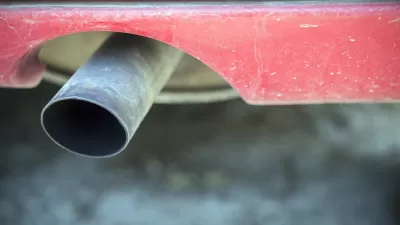California Assemblyman Phil Ting has tried unsuccessfully for the last two years to end the sale of new gas and diesel-powered passenger motor vehicles by 2040. He achieved some success by securing funds in an approved budget bill to study a ban.

"Last year, Assemblyman Phil Ting (D-San Francisco) introduced his Clean Cars 2040 Act, a sweeping bill to require every new passenger car sold in California to be a zero-emission vehicle within a little more than two decades," writes Dustin Gardiner, a state Capitol reporter for the San Francisco Chronicle.
After that bill died, he came back with a more modest proposal this session. AB 40 would have required the state to develop a strategy to get to the 2040 goal, without putting the ban into law.
However, that bill died as well.
“It’s actually embarrassing that California still hasn’t taken action,” Ting said, noting that countries including China, France and Britain have plans to promote the use of electric cars and other vehicles that don’t emit greenhouse gases. “If you want clean air, you need clean cars.”
[Correspondent's note: Jack Ewing, who reported on the French target on July 6, 2017, for The New York Times, acknowledged that it "is less ambitious than ones set by countries like Norway and India."]
"Ting found another route in the state’s new [$215 billion] budget, which lawmakers passed Thursday, thanks to a little-debated $1.5 million appropriation," adds Gardiner. "It helped that Ting was vice chairman of the conference committee that negotiated a budget deal among the Assembly, Senate and Gov. Gavin Newsom."
If Newsom doesn’t blue-pencil the idea out of the spending plan, state Environmental Protection Agency Secretary Jared Blumenfeld will work with state agencies to conduct the study. The budget doesn’t give a deadline for them to issue a report.
Broad-based study
The study, which won't include the 2040 timeframe for the ban, will not be confined to motor vehicle technology but would look at other strategies to "achieve carbon neutrality [pdf] in the [transportation] sector [...] such as changing land-use planning and increasing transit ridership."
That's good because the state won't meet its climate goals even if were to increase electric vehicle sales ten-fold, reported the Los Angeles Times last November. It would still need to reduce vehicle miles traveled per capita by 25 percent.
As to why AB 40 died this year, Gardiner reports that Sierra Club California, which strongly backed the bill, blamed it on Assemblyman Jim Frazier, D-Discovery Bay, who chairs the Transportation Committee. Frazier, in turn, criticized the Sierra Club for "refus[ing] to compromise on a few words of the bill’s language, which he didn’t specify."
Related in Planetizen:
-
Phasing Out the Internal Combustion Engine No Easy Task (Global Climate Action Summit): September 18, 2018
-
Momentum Builds to Ban Sales of Gas and Diesel-Powered Cars in California, November 10, 2017
Hat tip to Jim Stewart.
FULL STORY: California idea to study phasing out gas-powered cars wins new life

Maui's Vacation Rental Debate Turns Ugly
Verbal attacks, misinformation campaigns and fistfights plague a high-stakes debate to convert thousands of vacation rentals into long-term housing.

Planetizen Federal Action Tracker
A weekly monitor of how Trump’s orders and actions are impacting planners and planning in America.

San Francisco Suspends Traffic Calming Amidst Record Deaths
Citing “a challenging fiscal landscape,” the city will cease the program on the heels of 42 traffic deaths, including 24 pedestrians.

Defunct Pittsburgh Power Plant to Become Residential Tower
A decommissioned steam heat plant will be redeveloped into almost 100 affordable housing units.

Trump Prompts Restructuring of Transportation Research Board in “Unprecedented Overreach”
The TRB has eliminated more than half of its committees including those focused on climate, equity, and cities.

Amtrak Rolls Out New Orleans to Alabama “Mardi Gras” Train
The new service will operate morning and evening departures between Mobile and New Orleans.
Urban Design for Planners 1: Software Tools
This six-course series explores essential urban design concepts using open source software and equips planners with the tools they need to participate fully in the urban design process.
Planning for Universal Design
Learn the tools for implementing Universal Design in planning regulations.
Heyer Gruel & Associates PA
JM Goldson LLC
Custer County Colorado
City of Camden Redevelopment Agency
City of Astoria
Transportation Research & Education Center (TREC) at Portland State University
Jefferson Parish Government
Camden Redevelopment Agency
City of Claremont





























